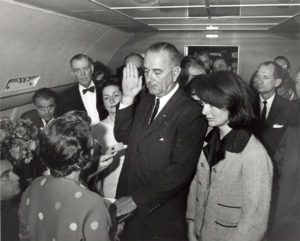As I watch Donald J. Trump’s chaotic first few weeks as president of the United States, I have to keep reminding myself: Does it really need to be this way?
Of course it doesn’t. We’re watching Trump stumble-bum his way through controversy after controversy and his ridiculous rants and riffs with foreign leaders.
Now we’re watching an potentially unfolding major-league scandal involving the president’s former national security adviser, who quit this week in the wake of reports that he had inappropriate — and possibly illegal — discussions with Russian government officials prior to Trump taking office.
Two presidents in my lifetime have taken office amid terrible tragedy and tumult. In both cases, these men grabbed the reins of power and assumed the role of president as if they’d been there all along.
Example one: Lyndon Baines Johnson took the oath of office on a jetliner sitting on a tarmac at Love Field in Dallas on Nov. 22, 1963. His predecessor’s body was in a casket in the back of the plane and the nation was in utter shock over what had happened earlier that day when a gunman murdered President John F. Kennedy.
LBJ flew back to Washington and asked the nation to pray for him. We did. He convened his team and got to work immediately.
The nation buried JFK a few days later, President Johnson went to Congress and declared “all that I have I would surrender” to avoid standing before the nation in that moment.
The nation marched forward.
Example two: Gerald Rudolph Ford became president on Aug. 9, 1974 as his predecessor resigned in disgrace. The House of Representatives stood poised to impeach Richard Nixon for high crimes and misdemeanors relating to the Watergate scandal. It took a stalwart Republican U.S. senator, Barry Goldwater, to tell the president his time was up. He had no support in the Senate, where he would stand trial after the House impeached him.
President Nixon quit. President Ford took the oath and then told us, “Our long national nightmare is over.” He told us he was “acutely aware” he hadn’t been elected vice president or president. But he was the right man for the job.
He, too, called his team together and instructed them to get back to work.
President Ford would lose his election battle in 1976 to Jimmy Carter. It was Carter who, upon taking the oath of office in January 1977, would turn to his predecessor and begin his inaugural speech by thanking the former president for “all he had done to heal our country.”
Presidents Johnson and Ford had something in common: they both had extensive government experience prior to assuming their high office. They knew how the government worked. LBJ had served as Senate majority leader before becoming vice president in 1961 and had many friends on both sides of the partisan divide. Ford had served as minority leader in the House of Representatives before Nixon tapped him to be vice president in 1973 after Spiro Agnew quit after pleading no contest to a corruption charge. Ford also had many friends on both sides of the aisle.
These men assumed the presidency under far more trying circumstances than Trump did, yet they made the transition with relative ease … compared to the madness we’re witnessing these days with the 45th president.
We are witnessing in real time, I submit, the consequences of electing someone who brought zero public service experience to the most difficult and complicated job on Planet Earth.
